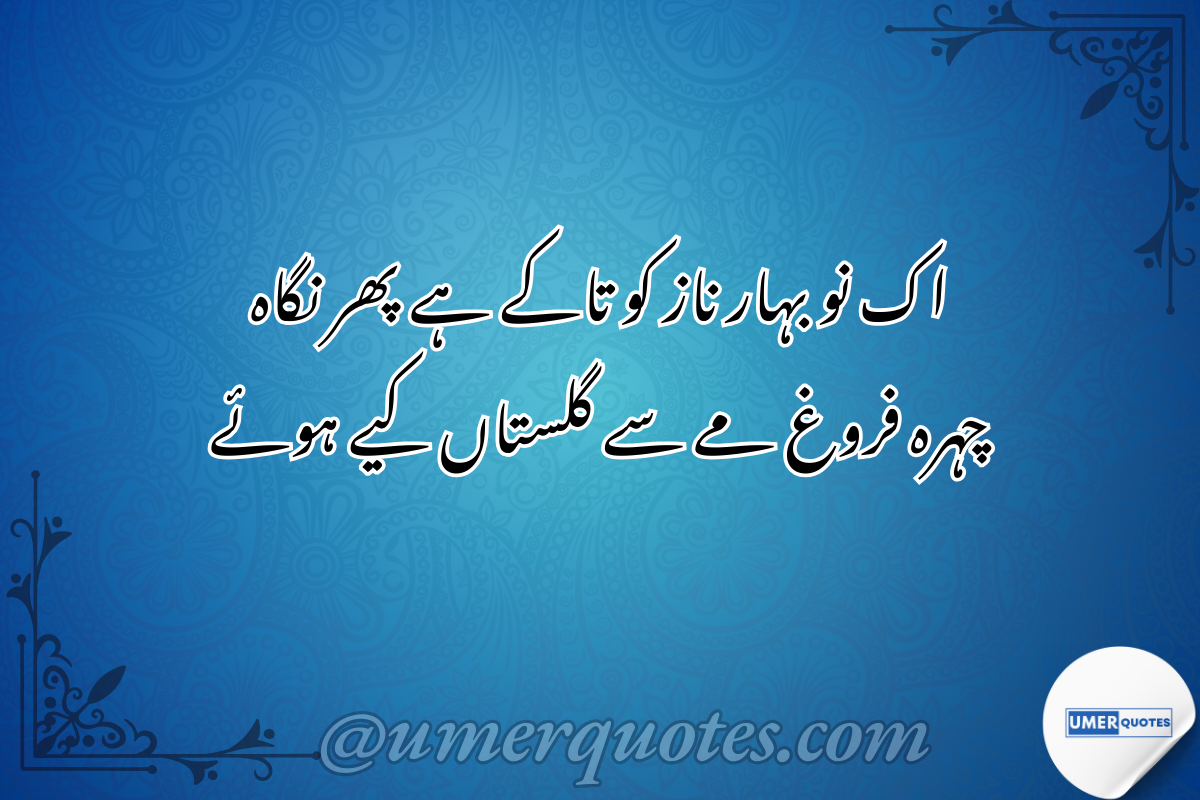
اک نو بہار ناز کو تاکے ہے پھر نگاہ
چہرہ فروغ مے سے گلستاں کیے ہوئے
A new spring to Naaz is looking again:
This stanza refers to a beautiful and charming moment. “Ek No Bihar Naaz Ko Taake Hai Phir Nigah” means that a new and fresh spring is about to begin, in which a new form of beauty and charm is about to emerge. “Naz” here refers to the state of one’s attractiveness or pride, and the mention of “gaze” refers to the waiting or meditative state, when one is eager to see someone’s presence or beauty.
The face is decorated with perfume:
This stanza describes the aesthetic and psychological state of a human being, whose presence or personality has an attraction that brightens the environment. “Face full of May” means that the person’s face is attractive like perfume or May, which is like a vase, which smells like flowers. “Glorified” means that his face, or his presence, is like a garden full of fragrant or colorful flowers, which makes the atmosphere pleasant.
click here for more
Message:
These poems depict love or one’s beauty in a very charming and absorbing way. Like a new spring, love or beauty is beginning, and the person or the moment is so full of charm that the face is like a flower decorated with perfume. These poems are a sign that beauty, narcissism and charm make a person’s personality in a new color and create attractiveness in the environment.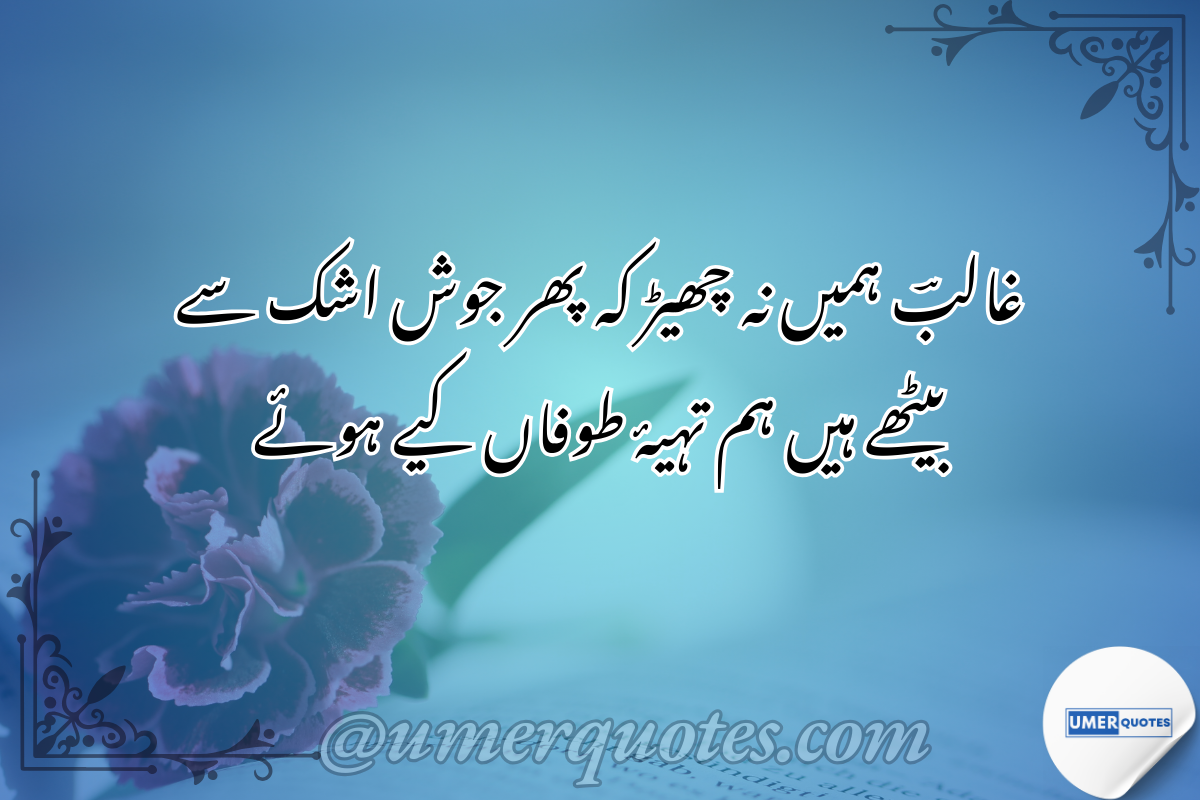
غالبؔ ہمیں نہ چھیڑ کہ پھر جوش اشک سے
بیٹھے ہیں ہم تہیۂ طوفاں کیے ہوئے
This poem describes the intensity of Ghalib’s emotions and his state of restraint. “Don’t tease us,” says the poet, “because if you do, the storm of hidden tears in your eyes will come out.” They are sitting with restraint, but there is a storm of sorrow hidden inside the heart.
Ghalib do not tease us with excitement:
This stanza describes the intensity of Ghalib’s emotions and the depths of his heart. “Tease us not” means not to provoke the poet or man about his sorrows and sorrows, for if he bursts out with anger or emotion, they will re-emerge in the form of tears. “With tears of passion” means that the heartache or grief is so intense that if the person is touched, it will flow out through the eyes.
We are sitting in a storm:
This stanza describes the inner conflict and emotional state of man. “Tahiya Toufan” means that a person is in a state of storm inside, as if his heart is restless and full of sorrows. But still he “sits” that is, outwardly calm and hiding the inward storm. It is a psychological picture, in which a person tries to hide his inner pain from the outside, even though inside he is in a restless and stormy state.
Message:
These poems describe the inner sorrow of man and the pain of his heart. In this verse, Ghalib has described the fact that when there is sorrow and grief in a person’s heart, he not only bears their effects internally, but gives the impression of a calm and unaffected personality from the outside. is These verses show that sometimes the inner state of man is so complicated and stormy that he tries to keep himself still from the outside.
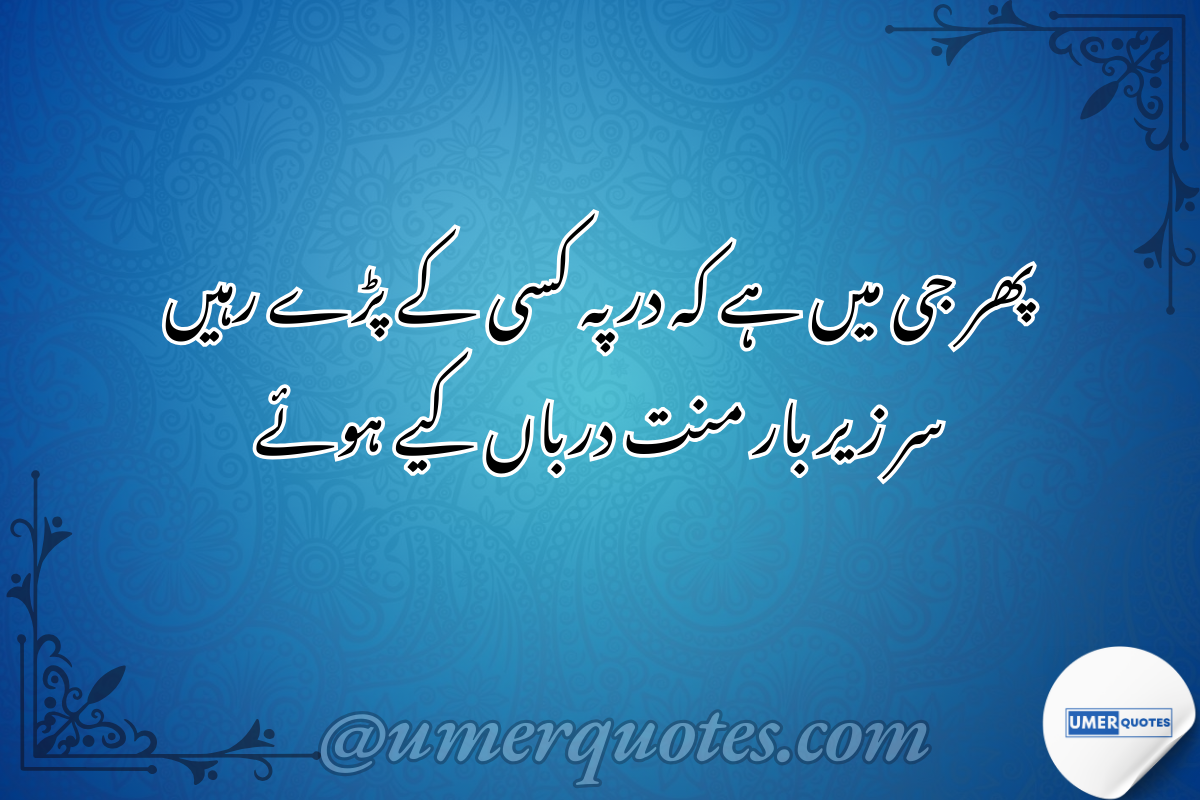
پھر جی میں ہے کہ در پہ کسی کے پڑے رہیں
سر زیر بار منت درباں کیے ہوئے
Then I agree that someone should be lying on the door:
This stanza describes a deep emotional and spiritual state. “Then I am” means that a person’s heart and mind are now in a certain state, as if he longs to be at someone’s door. It indicates a state of humility, where one wants to express one’s humility and neediness by being at someone’s door.
Praying over and over again:
This verse shows the complete humility and neediness of man. “Sir Zar Bar Mant” means that a person leaves all his dignity and arrogance and approaches the door with his head bowed to ask someone for something. “Gated” means that the person is now ready to present their application to the gatekeeper (gatekeeper). This picture indicates that That when a man has a strong desire for something or is in a position to ask someone for something, he approaches the door with complete disregard for his self-respect.
Message:
These poems describe the helplessness, neediness and humility of man. When a person’s condition becomes extreme, he puts his dignity in the dust and hopes for someone to help him. These poems are an expression of the fact that sometimes in life a person feels the need to pray or request someone to leave his ego and arrogance. They also say that one’s door becomes a place of hope and demand for him, where he waits for his destiny.
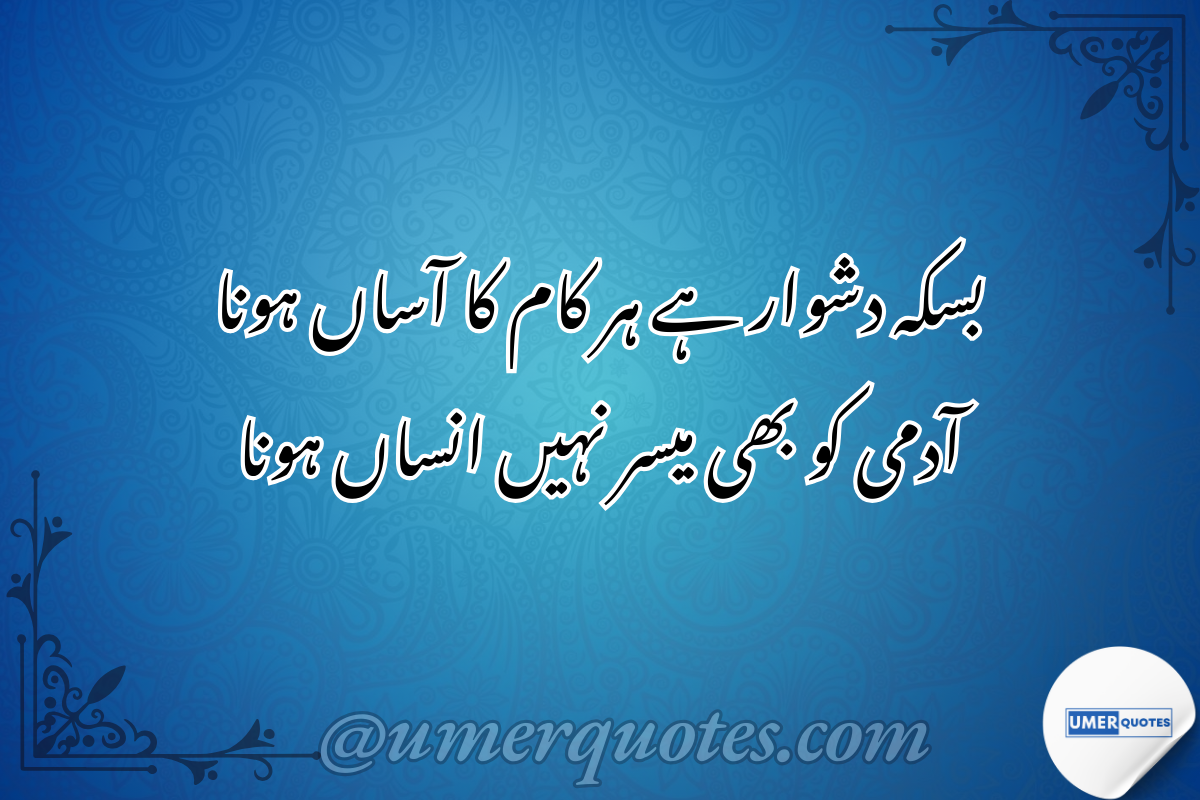
بسکہ دشوار ہے ہر کام کا آساں ہونا
آدمی کو بھی میسر نہیں انساں ہونا
It is difficult to make everything easy:
This verse refers to the complexities and difficulties of life. “Difficult” means that not every task can be easily completed. Whatever a person does, be it personal or social, it requires hardships, toil, and struggle. The poet acknowledges that success or achievement in life is not possible without suffering or hard work. This verse highlights the importance of human effort and hardships.
Even a man cannot afford to be human:
This verse describes the reality of man and his self. “Man is not able to be human” means that man fails to attain his full humanity, i.e., man sometimes falls short of his original or moral high standard. The poet here points to the weaknesses, selfishness and false attitudes of man, which keep him away from true humanity.
Message:
These poems describe the reality of man’s inner condition, despite his hard work and struggle. The poet explains that not everything in the world is possible to be easy, and in the same way a human being cannot fully attain his true humanity, because there are many weaknesses and complexities within him. There is a deep truth in this that despite the progress and success of man, he continues to face many weaknesses and moral challenges within himself.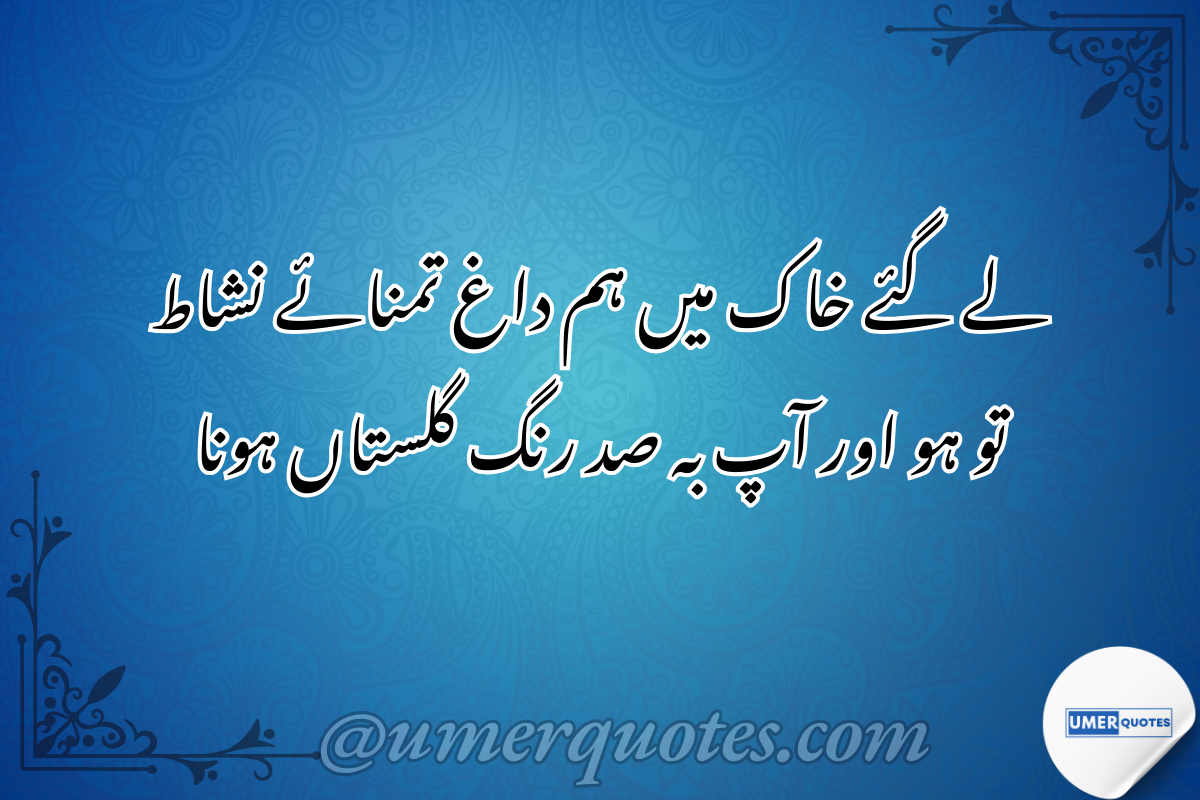
لے گئے خاک میں ہم داغ تمنائے نشاط
تو ہو اور آپ بہ صد رنگ گلستاں ہونا
We wish for life in the dust we have taken away:
This stanza describes the state of the human heart and the reality of its aspirations. “Take us to the dust” means that the poet buries his desires, longings, and emotions in the mud (dirt), meaning that his desires cannot be fulfilled or he has failed in them. “Dagh Tamnoy Nishat” means the result of these desires or aspirations It has turned out to be a stain of grief or regret. The poet is describing that his wishes for happiness were buried in the dust, and they left only traces of sorrow and grief.
So be and you will be in a hundred colors:
This verse addresses a loved one or a loved one. “To Ho” refers to longing for the presence of the Beloved or the Beloved. “Aap Ba-Sad Rang Gulstan Hona” means that life becomes rich, colorful, and fragrant in the presence of a loved one. “Hundred colors” means that its presence brings innumerable qualities and colors to life, Like a procession of different colors and fragrances in a flower garden. This stanza describes a beautiful and charming scene, where the presence of the Beloved changes everything and fills life with fragrance and colors.
Message:
These poems describe the failure of human aspirations and their sorrow, but also show the importance and impact of the presence of the beloved or dear. The poet connects his sorrows with the fact that the presence or company of the beloved makes life happy, colorful and fragrant. These poems show that although one’s wishes and desires are not fulfilled, but the presence of love and happiness adds a new color to life.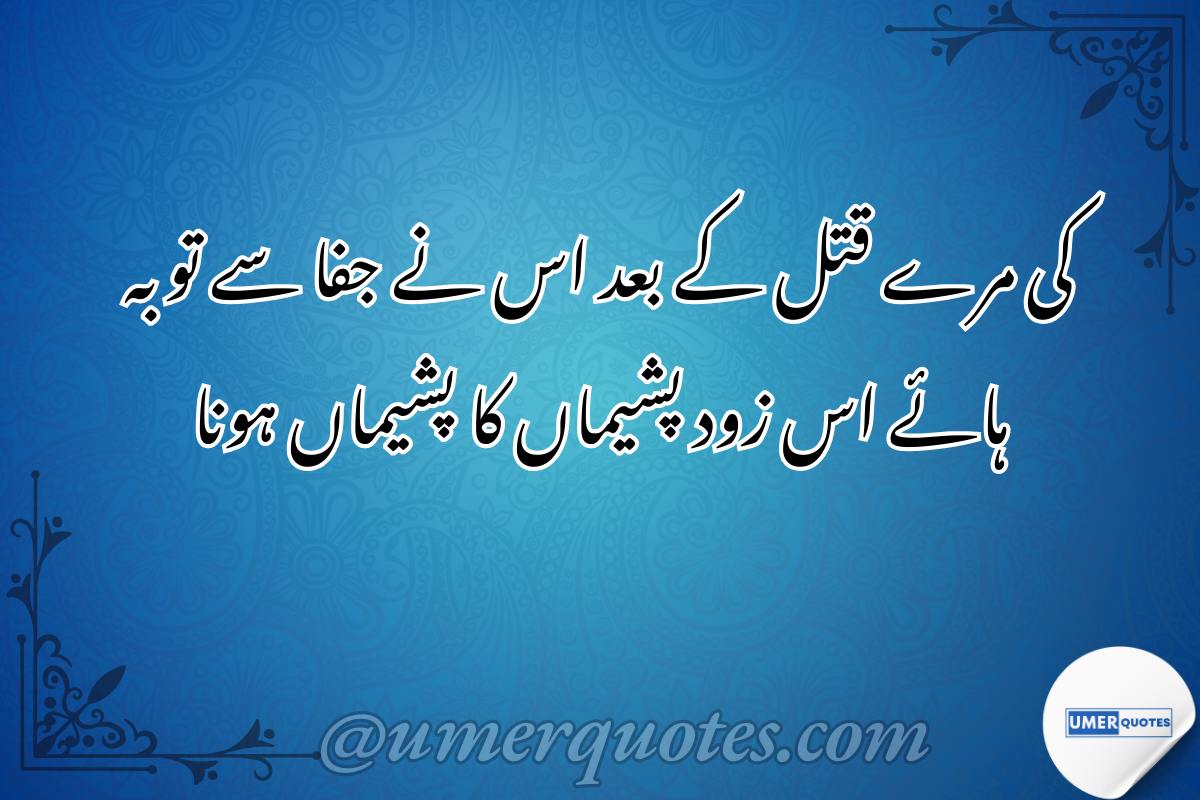
کی مرے قتل کے بعد اس نے جفا سے توبہ
ہائے اس زود پشیماں کا پشیماں ہونا
After killing the dead, he repented from Jaffa:
This stanza is Ghalib’s famous portrayal of sad and painful grief. “After the murder” means that the beloved or loved one broke his heart or was unfaithful to him, meaning that he caused the poet great pain. “Repentance from Jaffa” means that the beloved has repented of his Jaffa (cruelty, unfaithfulness), that is, he now repents of his negligence or He has regretted his infidelity and repents of his wrongdoing. This stanza shows that the person who hurt the poet is now realizing his mistakes, but by then it is too late.
Oh, the regret of this early regret:
This stanza describes the regret and sorrow that one feels of late. “Quickly repented” means that the person repented quickly, i.e. he realized his mistake quickly. “To be remorseful” means that he expresses his remorse and regret, but this has become meaningless at this point because the person being remorseful has already been harmed. The poet describes this fact here There is no point in expressing remorse when the effects cannot be stopped and the damage has already been done.
Message:
These poems describe the state of man’s regret and late understanding. The poet laments that the beloved or loved one ignored his sorrows and pains until he himself became sorry. These poems show the depth of regret and the helplessness of man’s mistakes, when late realization or regret cannot lessen the pain that has already occurred.

دونوں جہان تیری محبت میں ہار کے
وہ جا رہا ہے کوئی شب غم گزار کے
Lose both worlds in your love:
This stanza describes the love and sacrifice hidden deep in the poet’s heart. “Both worlds” means the world and the hereafter or everything that is important to man. “Teri Mohabbate Me Haar Ke” means that the poet has sacrificed everything in his life for the sake of love. Here the meaning of “give up” is that the poet has given up all his ambitions, desires and self-respect to the love of the beloved.
He is going to spend the night:
This stanza describes the separation of a loved one. “He is going” means that the person, with whom the poet is in love and attachment, is now departing. “Koi Shab Ghaem Ghazaar Ke” means that the person is leaving after a long night of grief, i.e. he endured the pain of a love or relationship and is now trying to get rid of it. This stanza shows a sad situation, where after suffering in love, the person is now trying to end the relationship.
Message:
These poems describe the condition of a heartbroken and sad person, who sacrificed everything for his love, but now the person, on whom his heart was, no longer loves him. The poet here describes the intensity of his sacrifice and pain, and also shows the pain that a person suffers when love does not succeed.
click here for more

اک فرصت گناہ ملی وہ بھی چار دن
دیکھے ہیں ہم نے حوصلے پروردگار کے
I got a chance to sin, that too for four days:
This verse refers to the transience of a moment and a temporary tendency towards sin. “Opportunity to sin” means the particular occasion or time when a person had an opportunity to sin, i.e. a situation arose when a person took a step towards sin. The mention of “four days” suggests that this opportunity was very temporary, only for a short period of time. The poet here expresses the fact that the occasion for sin is short-lived, and its end is often mortal and temporary.
We have seen the courage of the Lord:
This verse refers to the spirituality of man and his inner strength. “The courage of God” means that the poet felt the power of Allah and the courage to follow His religion. This means that despite the temporary occasion of sin, the poet turned to his spirituality and to Allah and found his strength through His help.This verse shows that in the event of sin, a person’s faith and guidance from Allah boosts his morale, and he tries to follow the path of Allah instead of turning to sin.
Message:
These poems describe the conflict between sin and spirituality. The poet acknowledges that man is prone to sin, but he finds his faith and courage in God’s guidance and sees his strength in His help. These verses teach an important lesson that the inclination to sin is temporary, and the inner courage of man, which is found in God, gives him the strength to stay on the right path.






